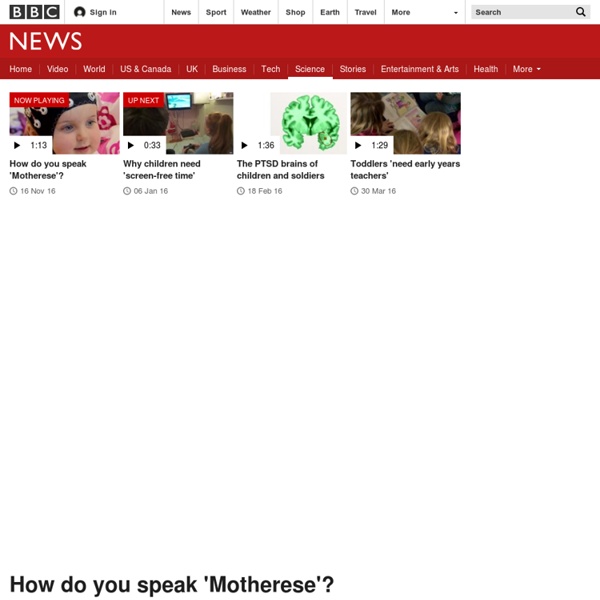



http://www.bbc.com/news/av/science-environment-38007057/how-do-you-speak-motherese
Related: Early Childhood Development • English teaching early years • FutureLearn_EnglishInEarlyChildhood • English in Early ChildhoodHow young children learn English through play As we release Learning Time with Timmy – our first app for early-years learners of English – Danitza Villarroel, a teacher on our Learning Time with Shaun and Timmy course in Chile, explains the importance of learning through play, and offers a few tips for teachers new to this age group. Teaching English to pre-school children can be daunting for teachers new to this age group. Young children have shorter attention spans than older children and adults, and they're still learning their mother tongue. Early childhood development – it’s not rocket science, it’s neuroscience! - Kathy Brodie Early Years Training I was introduced to Mine Conkbayir when she contacted me about neuroscience informing early years practice, which I think is such an exciting, and growing, area of study. So I was very enthusiastic when she offered to do a guest post on this subject. Here she discusses how neuroscience can add another dimension to our understanding of child development:
The cognitive benefits of play: Effects on the learning brain © 2008 - 2014, Gwen Dewar, Ph.D., all rights reserved Science supports many of our intuitions about the benefits of play. Playful behavior appears to have positive effects on the brain and on a child’s ability to learn. In fact, play may function as an important, if not crucial, mode for learning. Want specifics? Here are some examples. MIT Brain Study: Back-And-Forth Talk Key To Developing Kids' Verbal Skills Sign up for the CommonHealth newsletter to receive a weekly digest of WBUR’s best health, medicine and science coverage. New MIT research finds that for children's brain development, parents don't just need to talk to their kids — it's important to talk with them, in back-and-forth exchanges. Story continues below Most Viewed Stories "What we found is, the more often parents engaged in back-and-forth conversation with their child, the stronger was the brain response in the front of the brain to language," said cognitive neuroscience professor John Gabrieli. That stronger brain response, measured as children ages 4 to 6 lay in a scanner listening to simple stories, reflects a deeper, more intimate engagement with language, said graduate student Rachel Romeo.
Importance of play for babies & children Play is more than just fun for babies and children. It’s how they learn best, and how they work out who they are, how the world works and where they fit into it. You can read this article in a selection of languages other than English. The importance of play Listen to Your Mother Young children face a remarkable challenge in learning to use the language of their culture. Toddlers vary widely, however, in the rate at which they learn new words.1 A team of Harvard Graduate School of Education researchers set out to ask whether and how children's language environment can impact vocabulary development. In their study of mother-child pairs from low-income families, they found that mothers who used many different words (not just many words) had toddlers with faster growth in vocabulary use. During the toddler and preschool years, most children learn to use hundreds of words, combining them into sentences and engaging in conversation with others. From previous research, we know that variation in vocabulary growth relates to child characteristics like gender, and also to parental factors. What did they find?
Scientists Say Child's Play Helps Build A Better Brain : NPR Ed Deion Jefferson, 10, and Samuel Jefferson, 7, take turns climbing and jumping off a stack of old tires at the Berkeley Adventure Playground in California. The playground is a half-acre park with a junkyard feel where kids are encouraged to "play wild." David Gilkey/NPR hide caption toggle caption David Gilkey/NPR Deion Jefferson, 10, and Samuel Jefferson, 7, take turns climbing and jumping off a stack of old tires at the Berkeley Adventure Playground in California. Why Movement is Essential in Early Childhood With so few years under their belts, my 3- and 6-year-old daughters are still learning to inhabit their bodies. They are learning how to maneuver themselves physically, how to orient themselves in space. As Vanessa Durand, a pediatrician at St. Christopher’s Hospital for Children in Philadelphia, says, freedom of movement is necessary for children to meet their developmental milestones: “Children learn by experiencing their world using all of their senses.
Practical tips By Opal Dunn, educational consultant and author Introduction Young children learn English differently from most adults.